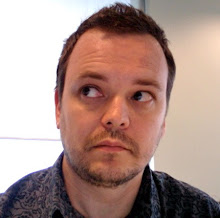LazyTown, unusually for a serious philosophical work, is aired twice a day on CBeebies and features a number of puppets. It is set in the fictional village of LazyTown, governed by the bumbling but benign Mayor Milford Meanswell. The mayor is one of only two adult citizens, the other being his unrequited love Bessie Busybody. All the other citizens are children with various stereotypical faults – Ziggy is addicted to sweets, Trixie is a trickster and Stingy is stingy (you get the point). It’s obvious that Scheving is setting up a subtle Swiftean satire through this device. Especially when the plot introduces forces of good and evil into the children’s world.
On the side of good are pink-garbed Stephanie, the Mayor’s active and well-meaning niece, and Sportacus, the town’s athletic self-appointed guardian who lives a monastic lifestyle in an airship.
The force of evil is represented by Robbie Rotten, the idle, Machiavellian schemer who lives under the LazyTown in some form of nether-house.
One can perceive the influence of the Christian mythos in the dialectic of good coming from above and evil below. Like Milton’s Satan declaring war on Heaven, Robbie repeatedly seeks to overthrow Sportacus and enforce his order upon the universe. However, he is frequently undermined by his own failings as much as Sportacus’ intervention.
Perhaps in a nod to Manichaean dualism, the equilibrium of the LazyTown universe is restored at the end of each episode and Robbie is never punished. How this particular policy affects LazyTown society is clear – Robbie repeatedly causes trouble, upsetting the town’s harmony. Does this suggest that society needs evil in order to evolve and have meaning? It’s surprising that the failure to punish crime is never raised as an election issue in Lazy Town’s democratic process. If a custodial sentence is out of the question, perhaps Robbie should at least be tagged?
The other intriguing subtext of LazyTown is that Spartacus’ life is actually entirely empty. Aside from his interactions with the inhabitants of LazyTown, he lives in solitude, trapped in iron routines that would test the sternest ascetic. Does this suggest that pure good is as undesirable as pure evil? Or that the gods only have a point to their existence when they interfere in human affairs? It is these ambiguities that keep me returning to LazyTown morning after morning, like a pilgrim seeking spiritual revelation in a candy-coloured world.


3 comments:
as one of the director's of lazytown i thoroughly enjoyed this thoughful essay.
For a more realistic portrayal of how good and evil interacts and informs each other in the real world you should really take another look at Chorlton & The Wheelies... like, it's all there, man!
Thanks for the kind comment, Jonathan - I clearly watch far too much Cbeebies with my 2 year old!
Steve - Chorlton is old skool, it's true - but living in a kettle is SOOOO '70s, man!
Post a Comment